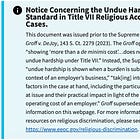It’s almost 2025, and yet here I am, still getting emails from folks asking how they can stand up to employers demanding they—you guessed it—cover their faces.
I can’t believe we’re ending this year and some people are still being coerced, intimidated, and threatened into restricting their only two airways.
Listen, if you choose to do this voluntarily—go for it. Have at it. But let’s be clear: choices like this, which are medical interventions, should be just that—choices. Not requirements dictated by employers or governments.
Case in point: an employee who got an exemption from the “cocktail” (you know what I mean) is now being told he has to slap on a face covering as his so-called accommodation for not becoming a human pin cushion.
Can someone help me out here—what’s the point of rolling up your sleeve for the magic jab if you’re still living in fear over someone breathing oxygen?
Oh wait, nevermind—I forgot. Science these days is just a game of Simon Says.
Simon says wear a mask. Simon says take the jab. Simon says fear fresh air. Simon says—Hold up! Did you just ask a logical question? Simon didn’t say you could think! You’re out.
Friends, we’ve been over this: DO NOT ASK QUESTIONS!
Questions like these:
If the masks work, then why do you have to wear one to protect others?
If this disease is so deadly that you could kill someone by just breathing on them, then why can’t you just “breathe on the swab” instead of having it inserted up to your brain?
If the symptoms for the flu and cooties are the same, then what does the test test for?
If the jabs work, then why do you have to get jabbed to protect others?
They don’t get answered. Ever. So, don’t even bother asking!
Anyway...
This Healthy American reached out to me for help, and I figured the best way I could assist him—and others—is to do a video and Substack post on this. At the very least, we can take a moment to mock the absolute absurdity and arbitrary nonsense of it all. Because, honestly, if we don’t laugh, we’ll cry... or maybe throw something.
These last four (soon to be FIVE) years have been some of the most frustrating years of my life just watching people blindly accept and follow whatever narrative gets thrown their way.
Now, I’ve been talking about this—oh, since 2020—but it’s so important that I will continue to repeat and repeat myself. Why? Because I want everyone to know: You do have rights. You do have choices.
And the sooner you learn your rights and stand up for them, the better, before they’re stripped away and you’re left wondering where your freedom went.
Let’s start here: you are not asking your employer for a favor. You are not asking for permission to not become a human pin cushion.
You are informing your employer of your moral, ethical, or religious objections. Period.
If you are standing on religious grounds, you want to make sure that you don’t bring in arguments about side effects or the fact that these haven’t been tested (as if testing would make them safe). If you start talking about the vitamins you take, how you exercise every day, or how you don’t eat junk food or drink alcohol—that is not going to cut it. Unfortunately, your employer will construe those arguments as a personal objection.
Simple statements like: “I prayed about it, and God made it clear to me through prayer, meditation, or reading the Bible to not participate in vaccination” (Or whatever is true for you.) Short, sweet, and airtight.
Employers aren’t supposed to unravel your beliefs — although some like to try because they are either ignorant or evil… why would they employ you if they don’t trust your word?
There have been plenty of lawsuits I’ve covered that have resulted in awards of several million dollars per employee. For example, places like Blue Cross Blue Shield told employees—some of whom had worked there for decades—that they didn’t believe their religious objections. Well, you trusted them to work for you, but you don’t trust them when it comes to their sincerely held objections? That doesn’t add up.
Here’s the deal: under Title VII of the U.S. Civil Rights Act, your employer must offer you a reasonable accommodation. “Reasonable” is the key word, and trust me, employers have tried all kinds of unreasonable nonsense.
This is where it gets very important.
An accommodation is simply an adjustment to your job—perhaps where you work, the hours you work, or maybe even the type of work you do—in order to accommodate your religion so that you don’t have to violate, alter, or abandon your beliefs, practices, and observances.
I’ve given the example before of a cashier or pharmacist who has a sincerely held religious objection to selling birth control pills. In that case, the employee has the right to ask their manager or another employee to ring up the prescription instead. The employer is required to accommodate that.
The trick, though, is determining what’s “reasonable” and what’s “unreasonable.”
Let me give you an example of an unreasonable accommodation. I’ve had so many cases over the years, including in healthcare and public schools—California being the worst offender. In one case, a teacher’s accommodation was to teach remotely, but she had to drive three hours to a specific location to do it. That is unreasonable.
Clearly, the employer was trying to retaliate, punish, and make the accommodation so difficult that the teacher would give up and give in.
A reasonable accommodation, on the other hand, might be self-screening for symptoms and staying home if you’re sick.
Oh, but we all know the “logic” they’ll throw at you: “You might be sick and not know it.” Sure—just like I might have a broken leg and not know it. Should we all walk on crutches just in case?
Even in California, it’s nearly impossible to prove someone made another person sick. There are laws to protect you because such claims are flimsy at best.
Here’s the truth: if they’re singling you out while others go about breathing freely, it’s usually because of petty projection—“If I had to suffer, you’re not getting off scot-free.” It’s juvenile, it’s spiteful, and it happens more often than you’d think.
The key question is: what is your job?
For medical or face-to-face roles, accommodations might include tasks without direct contact—like case management. You’re not asking for a demotion, either—your pay stays the same.
If you’re dealing with this nonsense, start here:
“I will self-screen for symptoms and stay home if I’m sick.” (after all, isn’t home the safest place to be?!)
“I will maintain (the arbitrary) six feet of distance.”
“I’m open to a temporary role adjustment.”
This issue can get murky, and it’s up to you to determine what you’re willing to do.
Employers are legally required to explore these accommodations in good faith. They don’t have to give you your first choice, but they do have to collaborate to find a solution that:
Keeps you employed,
Respects your religious or moral beliefs, and
Doesn’t cause “undue hardship” for them — and it has to be a SUBSTANTIAL burden (proven with evidence).
And no, “It makes me (or others) uncomfortable” is not a valid hardship. The law doesn’t care about hypotheticals or what might be uncomfortable. It has to be a real, tangible, and provable burden—a substantial one—that impacts the employer’s actual business operations.
Requiring an employee to wear a mask as an accommodation is not only unreasonable but arguably retaliatory in nature. It’s not about protecting anyone—it’s about control. It’s always about control.
Now, for those of you in healthcare—yes, it’s the toughest battleground. Long before this “cootie hysteria,” hospitals had flu shot policies where the “unjabbed” wore masks for flu season. (Because, of course, the flu operates on a calendar system. How convenient.) And now, just like California's "year-round fire season", I’m guessing flu season is getting longer too.
But here’s the thing, you can still fight back against the nonsense because it is nonsense. Here’s an example of questions you could fire back at your employer (that they can never prove):
If [Employer] denies my reasonable accommodation request and insists on enforcing a retaliatory masking requirement based on an assertion that I am a health/safety risk, then please provide evidence of that claim, as follows:
1. Detailed documentation of the specific criteria used to determine that I pose a direct threat to others.
2. Any complaints or concerns raised by patients, visitors, or other employees in the last [time frame] I was maskless. If any, please provide copies of any written complaints or records of verbal complaints.
3. A list of individuals I have infected (by not wearing a mask) with the dates of infection, and the severity of disease transmitted. I would also like to have their contact information so I can send a note of apology, along with prayers for their continued good health. Additionally, provide me with the name and contact information of the licensed medical doctor who diagnosed these individuals and his/her proof that I infected them.
4. The criteria and proof that was used to determine that it was solely their interaction with me that caused these infections, and not their interaction with anyone else in their family, at work, out in public, or in this healthcare setting.
5. If [employer] considered any alternative accommodations before concluding I posed a direct threat, please describe each accommodation and the reasons for rejecting them.
6. An explanation for how you are able to accommodate visitors to the clinic, but not accommodate me along with evidence for how I am a direct threat in my maskless state, but that the maskless visitors coming into the clinic are not.
7. Evidence demonstrating that my religious accommodation of self-screening for symptoms and staying home if sick poses a significant risk to the health and safety of others.
8. Records of any training or education provided to [employer] HR employees regarding Title VII non-discrimination law. Include details such as: How long was that training? Who conducted it? What are the qualifications of those providing the training to the staff?
9. A list of those HR staff reviewing my accommodation request, along with a statement of faith for each individual. Who appointed these individuals? What are their qualifications to judge my faith? What assurances can you provide that there is no anti-religious sentiment influencing their decisions in my situation?
Those are just a sample of the many questions we posed to one of our clients who was fighting against the mask in healthcare and in the end, she was successful.
The exemption is what must be based on religious grounds.
The accommodation? That’s the negotiation. Conversations revolving around this can be secular in nature. That’s when all bets are off if they insist on a punishment like wearing a suffocation device.
If you feel harassed, pressured, or like you’re about to cave—don’t. You’re not alone. I’m here to help, and I offer limited VIP one-on-one coaching if you need it (email support@thehealthyamerican.org).
I’m not an attorney, but I’ve taught attorneys these laws and strategies so you can stand strong—whether it’s in the workplace, at school, or even as a patient.
If you want to dive deeper, check out my videos under “Medical Rights” and “Religious Exemptions.”
To everyone out there who’s standing firm, living by your convictions, and refusing to give in, give up, or hand over your rights—you inspire me. Let’s continue to march this all the way to Heaven.
Read Next:















Share this post